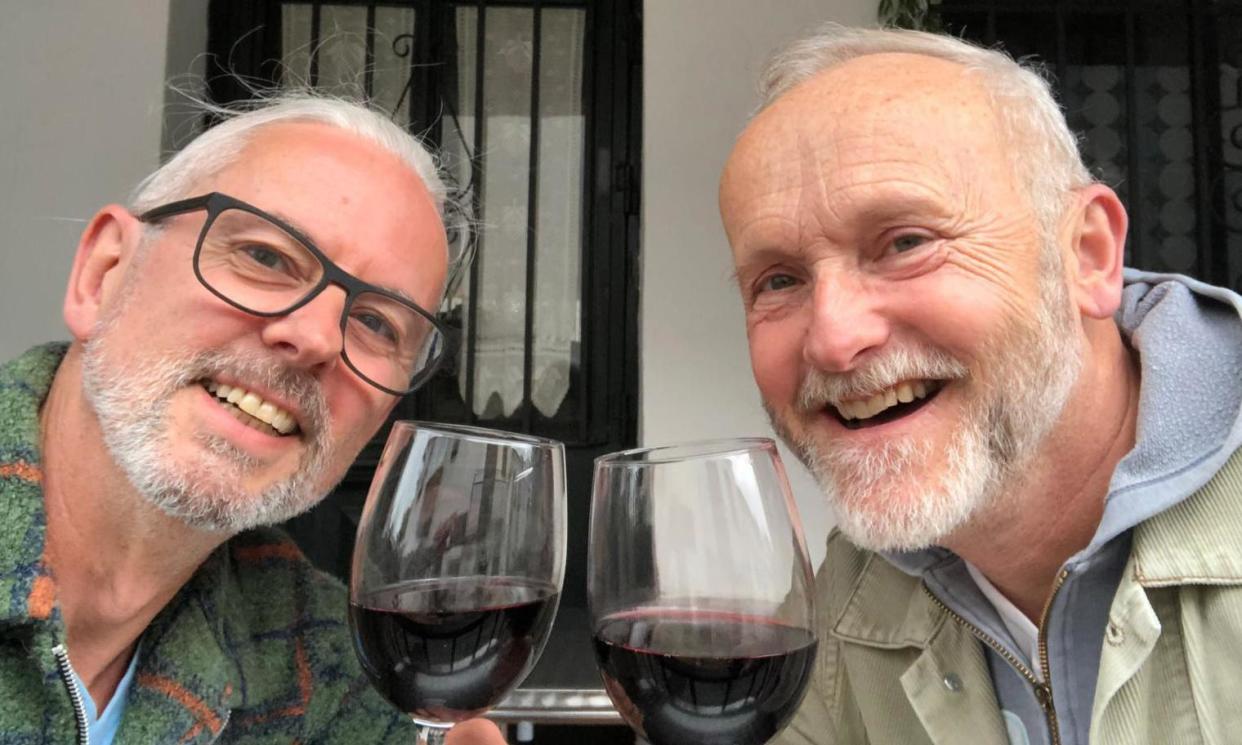‘We can’t rest on our laurels’: couples on 10 years of equal marriage in England and Wales

As midnight struck and Friday night turned into Saturday morning, Andrew Wale and Neil Allard were married. Hardly an unusual event, but their marriage took place 10 years ago and was among the first same-sex marriages in England and Wales.
Friday marks the anniversary of same-sex weddings, which for many gay people was the final barrier to full equality in the eyes of the law. At the time, the then prime minister, David Cameron, said the new law sent a “powerful message” about equality in Britain.
But it was a long road to equality. These rights were afforded gradually and in the face of severe public hostility. For most of the 20th century, engaging in “homosexual acts” for men was illegal. In 1967, the law changed when men over the age of 21 in England and Wales could legally have sex in private. This remained illegal in Scotland until 1980 and in Northern Ireland until 1982.
In 1994, the age of consent for gay men was lowered from 21 to 18. In 2001, it was lowered again to 16, the same as for straight people. Then in 2004, civil partnerships between same-sex couples were legalised and, 10 years later, England and Wales became the joint 16th and 17th countries in the world to legalise same-sex marriage. Cameron hailed the milestone at the time, saying it “says something about the sort of country we are”.
Wale, now 59, and 58-year-old Allard’s ceremony began at 12.01am on 29 March after they won a competition held by Brighton and Hove council to have their wedding inside the city’s Royal Pavilion. Friday is their 10th wedding anniversary.
“The day was fabulous but exhausting. When we came out to the Brighton Pavilion there was hundreds of people outside. People had seen it and they popped down to cheer us. It was absolutely amazing,” said Wale. After they married, the couple moved to Spain.
Wale said “things were pretty bad” growing up in the 1970s and 1980s. “It felt like a dark future. The language used against gay people was appalling. It’s the same kind of language I hear again now about trans people, which is very disturbing.”
In 1987, 75% of the UK public said homosexual activity was “always or mostly wrong”. A year later, Margaret Thatcher enacted section 28, which banned local authorities from “intentionally promoting homosexuality”. The law, considered a devastating hit to LGBTQ+ people, remained in place until 2000 in Scotland and 2003 in England and Wales.
Wale said the legalisation of equal marriage helped change things for the better to an extent but that homophobia still exists. In recent years, the number of hate crimes committed against LGBTQ+ people has risen. Government data released last October showed hate crimes on the basis of sexual orientation jumped by 112% in the past five years.
“More recently, things have reversed a bit,” said Wale. A few months ago, Allard was verbally abused in the street after returning to the UK. “The way they shouted at me and used a funny slur reminded me of being in the 70s. I was just a bit shocked. It still happens,” said Allard.
“We can’t rest on our laurels and think that all the work’s been done,” said Wale.
Tracey Austyn, 55, and Lisa Schrevel, 60, are also celebrating their 10th anniversary on Friday. “It was incredibly powerful to stand there in front of my mum and my aunts, who were all in their 80s and 90s, and openly make that commitment to each other and also after 50-odd years of a battle for equality,” said Schrevel.
While they both faced lots of good wishes about their relationship from their families, not everybody was supportive. For Austyn, who was previously married to a man, coming out later in life was difficult. “Some members of my family thought I was finally admitting to something that I’d always covered up which wasn’t true at all. Other family members were like, life’s gonna be really difficult and hard. Is this a choice you want to make? It was this real internal turmoil,” she said.
They both said their mums were incredibly supportive of their newfound love. “When I told my mum I said, ‘Oh, I’ve met someone mum and, well, it’s a woman’, and she said ‘That’s all right!’ and she immediately nicked all the flowers out of my sister’s vases around the house, wrapped them up and said ‘give her them’,” said Austyn.
A decade on Austyn said: “We’ve got 10 years and four stone between us … It feels like for ever in terms of comfort and security but it isn’t old.”


